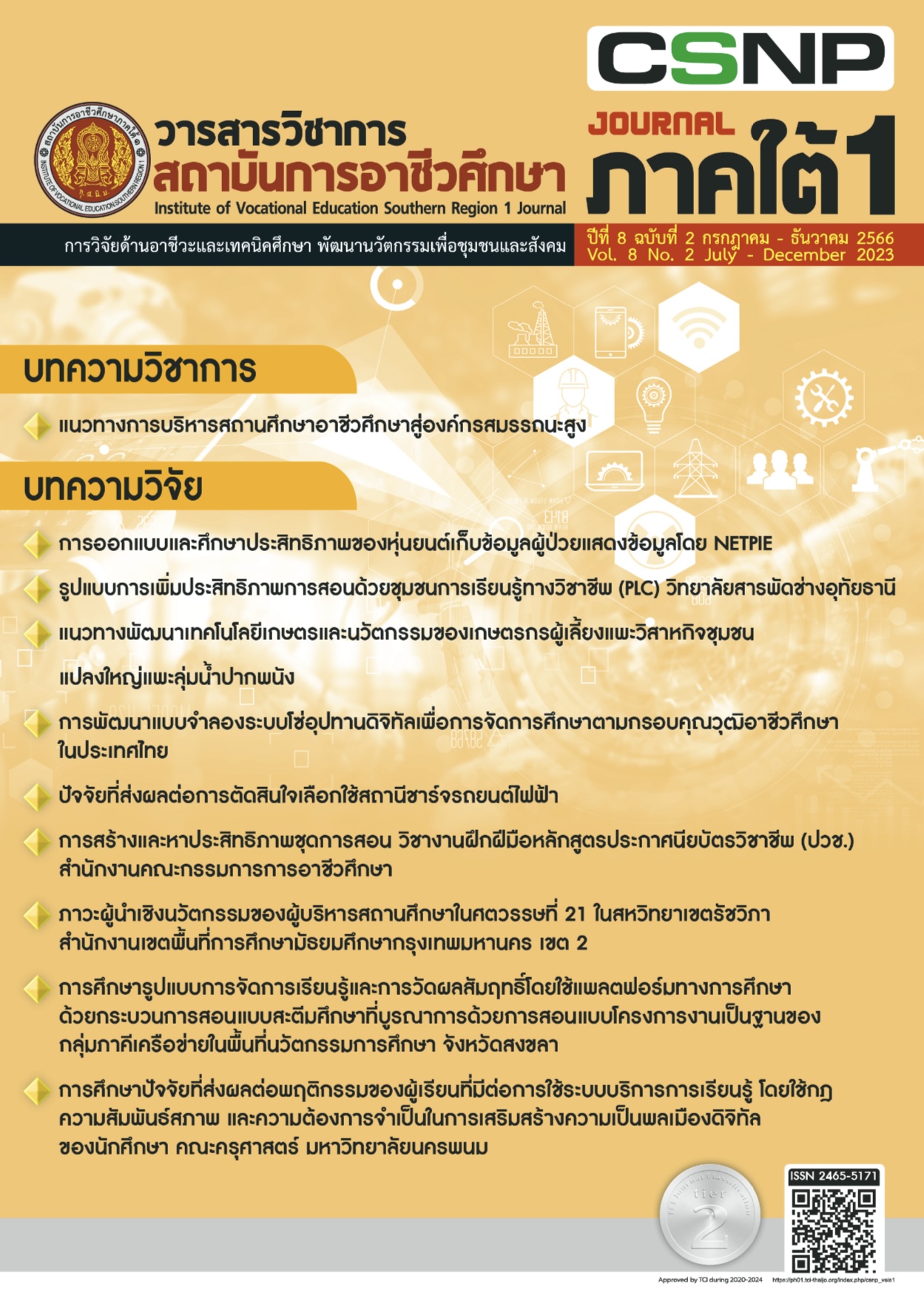The Development of a Digital Supply-chain System Model for Educational Management Based on the Vocational Qualifications Framework of Thailand
Keywords:
Development of Model, Digital Supply-chain System, Educational Management Based on the Vocational Qualifications Framework, ThailandAbstract
The development of a digital supply-chain system model for educational management based on the vocational qualifications framework of Thailand is composed of 7 elements, i.e., supplier, manufacturer, service provider, professional excellence student, customer, satisfaction, and response. The objectives of this research were to: 1) develop a digital supply- chain system model for educational management based on the vocational qualifications framework of Thailand and 2) assess the suitability of the digital supply-chain system model for educational management based on the vocational qualifications framework of Thailand. The sample group consisted of 5 experts in the field of supply chain and 5 experts in educational curriculum. Data analysis included the average mean and standard deviation. The measurement and the evaluation of the model were based on Black-box Testing.
The results showed that the experts agreed on the digital supply-chain system model for educational management based on the vocational qualifications framework of Thailand at a high level. This showed that the development of the digital supply-chain system model for educational management based on the vocational qualifications framework of Thailand can be applied in actual work settings.
References
สำนักงานคณะกรรมการอาชีวศึกษา. (2558). [ออนไลน์]. อาชีวะรับ10นโยบาย. [สืบค้นเมื่อวันที่ 17 พฤษภาคม 2566]. จาก https://www.vec.go.th/ข่าว/บริหารจัดการข่าว/รายละเอียดข่าว/tabid/103/ArticleId/3197/language/th-TH/-10.aspx.
สำนักงานคณะกรรมการอาชีวศึกษา. (2566). [ออนไลน์]. ประวัติความเป็นมา. [สืบค้นเมื่อวันที่ 17 พฤษภาคม 2566]. จาก https://www.vec.go.th/th-th/เกี่ยวกับสอศ/ประวัติความเป็นมา.aspx.
อรรถพล จันทร์สมุด. (2563). แบบจำลองระบบสารสนเทศเพื่อการจัดการงานวิจัยในโซ่อุปทานสำหรับสถาบันอุดมศึกษา. วารสารวิชาการที่ประชุมสภาข้าราชการ พนักงาน และลูกจ้าง มหาวิทยาลัยแห่งประเทศไทย (ปขมท.), 9(2), 112-121.
อรรถพล จันทร์สมุด. (2559). ระบบสารสนเทศการบริหารห่วงโซ่อุปทานเพื่อการจัดการงานวิจัยในสถาบันอุดมศึกษา. วารสารวิชาการ มหาวิทยาลัยหอการค้าไทย มนุษยศาสตร์และสังคมศาสตร์, 36(2), 210-221.
ประคอง กรรณสูต. (2528). สถิติเพื่อการวิจัยทางพฤติกรรมศาสตร์ (ฉบับปรับปรุงแก้ไข). กรุงเทพมหานคร: ศูนย์หนังสือ ดร. ศรีสง่า.
มหาวิทยาลัยราชภัฏนครราชสีมา. (2561). [ออนไลน์]. การสำรวจความพึงพอใจของประชาชนผู้รับบริการที่มีต่อการบริการขององค์การบริหารส่วนจังหวัดระนองประจำปีงบประมาณ พ..ศ. 2561. [สืบค้นเมื่อวันที่ 14 กันยายน 2566]. จาก http://www.oic.go.th/FILEWEB/CABINFOCENTER13/DRAWER007/GENERAL/DATA0000/00000286.PDF.
สำนักงานคณะกรรมการอาชีวศึกษา. (2566). [ออนไลน์]. คู่มือการใช้หลักสูตรประกาศนียบัตรวิชาชีพ พุทธศักราช 2556. [สืบค้นเมื่อวันที่ 17 พฤษภาคม 2566]. จาก https://bsq.vec.go.th/th-th/หลักสูตร/คู่มือหลักสูตร.aspx.
สำนักงานคณะกรรมการอาชีวศึกษา. (2566). [ออนไลน์]. คู่มือการใช้หลักสูตรประกาศนียบัตรวิชาชีพชั้นสูง พุทธศักราช 2557. [สืบค้นเมื่อวันที่17 พฤษภาคม 2566]. จาก https://bsq.vec.go.th/th-th/หลักสูตร/คู่มือหลักสูตร.aspx.
Kaewngam, A., Chatwattana, P., & Piriyasurawong, P. (2019). [online]. Supply Chain Management Model in Digital Quality Assurance for ASEAN Quality Assurance Network (AUN-QA). [Retrieved October 4, 2021]. from https://files.eric.ed.gov/fulltext/EJ1228330.pdf.
Chansamut, A., & Piriyasurawong, P. (2014). Conceptual Framework of Supply Chain Management - Information System for Curriculum Management Based on Thailand Qualifications Framework for Higher Education. International Journal of Managing Value and Supply Chains (IJMVSC), 5(4), 33-45.
Chansamut, A. (2021). [online]. Information System Model for Educational Management in Supply Chain for Thai Higher Education Institutions. [Retrieved October 4, 2021]. from http://www.riejournal.com/article_133791_83f64ffdee839868de07381d20410eab.pdf.
Chansamut, A. (2021). [online]. An Information System Model for Educational Management in Supply Chain According to Career standards on Thailand Qualifications Framework for Vocational Education. [Retrieved October 4, 2021]. from http://ojs.excelingtech.co.uk/index.php/IJSCM/article/view/5882/3035.
Chansamut, A. (2021). [online]. Synthesis of Conceptual Framework for Supply Chain Business Intelligence for Educational Management in Thai Higher Education. [Retrieved October 31, 2021]. from https://ojs.excelingtech.co.uk/index.php/IJSCM/article/view/5912/3041.
Chansamut, A. (2021). [online]. Supply Chain Operation Model in Digital for Curriculum Management Based on Thailand Qualifications Framework for Higher Education. [Retrieved October 4, 2021]. from https://ojs.excelingtech.co.uk/index.php/IJSCM/article/view/5893/3038.
Habib, M., & Jungthirapanich, C. (2010). International Supply Chain Management: Integrated Educational Supply Chain Management (IESCM) Model for the Universities. Sixth AIMS International Conference on Management 28-31 December 2008.
Habib, M., & Jungthirapanich, C. (2009). Research Framework of Education Supply Chain, Research Supply Chain and Educational Management for the Universities. International Journal of the Computer, the Internet and Management, 17(SP1), 24.
Habib, M., & Jungthirapanich, C. (2010). An Empirical Study of Educational Supply Chain Management for the Universities. Proceedings of the 2010 International Conference on Industrial Engineering and Operations Management. Dhaka, Bangladesh 9-10 January 2010, 292-298.
Habib, M., & Jungthirapanich, C. (2008). Integrated Education Supply Chain Management (IESCM) Model for the Universities. Sixth AIMS International Conference on Management 28-31 December 2008.
Habib, M. (2009). [online]. An Empirical Research of ITESECM (Integrated Tertiary Educational Supply Chain Management) Model. [Retrieved May 6, 2020]. from https://www.intechopen.com/chapters/11653.
Downloads
Published
Issue
Section
License
Copyright (c) 2023 Institute of Vocational Education Southern Region 1 Journal

This work is licensed under a Creative Commons Attribution-NonCommercial-NoDerivatives 4.0 International License.



